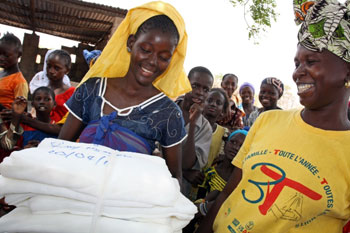Close to half of the 2.7 million ITNs distributed were given out through mass campaigns during an intensive 90-day period between May and July 2011.

A resident of Nioro in the Kaolack region of Senegal receives ITNs for her family from a community distribution worker. Source: Felicity Thompson/NetWorks
Since May 2010, the UC initiative has spread across the country. Currently, 35 districts spanning eight regions across the south and central belts of the country are now considered to have achieved UC. Close to half of the 2.7 million ITNs distributed were given out through mass campaigns during an intensive 90-day period between May and July 2011. With plans in place for UC campaigns in the northern regions of Matam and Saint Louis, the NMCP believes the entire country will achieve UC status by the end of 2012.
“PMI’s team in Senegal and its implementing partners work with the NMCP to meet its very ambitious targets for universal coverage,” says Akua Kwateng-Addo, USAID’s Senegal Health Team Leader. “This program is a model of the kind of collaborative support that makes PMI so effective in Africa.” To guide and ensure quality implementation of activities and to address issues that arise during mass distribution campaigns, PMI’s Senegal team also works closely with the National Malaria Coordinating Committee, which is composed of staff from the NMCP, donors, and implementing partners.
Mass distribution campaigns begin with planning sessions at the national and district levels. These sessions are followed by regional- and district-level orientations on UC principles, campaign procedures, and respective roles for community distribution workers called relais, traditional communicators, and community leaders. Relais conduct door-to-door censuses where they record household members, sleeping spaces, and existing nets. In addition, they issue each household a coupon with the date and location of the LLIN distribution. A local coordinating committee compiles and validates the census results and determines the number of nets to be given to each family. Once these steps have been completed, distribution ceremonies are held in each village or local neighborhood, and the ITNs are handed out. During the week immediately following the distribution, relais revisit homes to ensure the nets have been correctly hung and to encourage use of the nets every night.
Every household must be reached and protected. Therefore, information on the distribution process and proper use and care of the nets is disseminated through traditional communicators, local leaders, and community radio spots and programs. And because mosquitoes are always present, the mass distribution campaigns use the slogan “Les Trois Toutes” to promote net use by “the whole family, all night, all year round.”
Monitoring and Evaluation
Monitoring and evaluation is a key element of the campaigns and a strong focus of PMI’s work in Senegal. During the campaigns, national and local officials monitor the program using checklists and other tools to track the progress of each step of the process. A quantitative survey involving 1,560 households in some of the first districts to receive ITNs – Kedougou, Kolda, Sedhiou, Tambacounda, Kaffrine, and Kaolack – is now complete. The survey is assessing the effectiveness of the mass distribution approach and communication strategy to ensure optimal use of the ITNs. Preliminary results from the survey are expected by the end of 2011 and will be used to improve future net distribution efforts.
Follow-Up
Once the mass distribution campaigns are complete there is still more to do; newborn children and people moving into the area will need to be protected. The NMCP will implement a program to establish ongoing, continuous LLIN distribution, so every sleeping space is covered and households and communities continue to have access to ITNs for malaria prevention.
Senegal’s experience with the LLIN distribution and use promotion process could have an impact beyond its national boundaries. Lessons learned will be shared with the Roll Back Malaria Partnership to improve national distribution and use promotion efforts in other countries and improve global LLIN policy.
